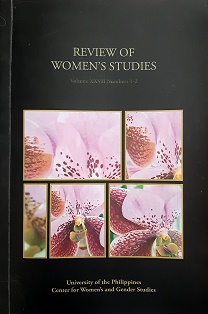Three Years After Yolanda: Economic Rehabilitation vis-a-vis Domestic Workload among Women in Guiuan, Eastern Samar
Abstract
The differing level of participation and engagement in development processes among men and women and the low valuation of women's unpaid care work are among the relevant gender-related issues today. These two concerns intersect in the context of economic rehabilitation such as in post-calamity scenarios where women participation in livelihood programs contribute to the (re)classification of their domestic workload and vice versa. It is in this light that this study explored the level of participation in livelihood programs among women in two communities of Guiuan, Eastern Samar which was strongly hit by Yolanda, the country's deadliest typhoon on record. The interrelation between these engagements with domestic workload schemes were also examined. The data were gathered through participant observation, semi-structured interviews, and focus group discussions. One salient view among many informants is the primacy of women's role in the domestic space thereby making tasks outside of it as secondary. This inevitably shapes their participation in livelihood projects in terms of time and range of initiatives. Meanwhile, other factors such as limited social skills, economic independence from spouse, and higher educational attainment also appear to influence the lack of participation among other women. Hence, in order to facilitate enhanced women engagement, livelihood programs should take into account how women in a particular community view the domestic sphere and their roles in it. More importantly, there is a need to equip marginalized women with skills necessary to engage not only in livelihood projects but in wider economic development processes.
Published
2023-05-11
How to Cite
CABAZARES, Sheila Mae T.; NICOLAS, Melody Amor S..
Three Years After Yolanda: Economic Rehabilitation vis-a-vis Domestic Workload among Women in Guiuan, Eastern Samar.
Review of Women's Studies, [S.l.], v. 27, n. 1-2, may 2023.
ISSN 0117-9489. Available at: <https://journals.upd.edu.ph/index.php/rws/article/view/9056>. Date accessed: 26 sep. 2025.


